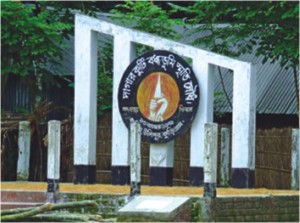| Journey through Bangladesh
From IKurigram
Remembering the Genocide at Hatia
Abdul Wahed
 THE Hatia Massacre (Genocide) Day was observed on 13 November 2009 at Ulipur upazila of kurigram. Work to construct a memorial has begun near the Old Anantapur Bazar area in Hatia union under Ulipur upazila to keep the tragic memory of the massacre of 1971 alive. THE Hatia Massacre (Genocide) Day was observed on 13 November 2009 at Ulipur upazila of kurigram. Work to construct a memorial has begun near the Old Anantapur Bazar area in Hatia union under Ulipur upazila to keep the tragic memory of the massacre of 1971 alive.
On this day, while the country was still fighting for its freedom, one of the largest mass killings took place in Dagar Kuthi village of the Hatia union. The Pakistani army, aided by information provided by Rajakars, killed 697 people including female and children of seven villages. The invaders burned houses to the ground and tortured women. Hatia union, under Sector 11 during the liberation war of 1971, was home to many freedom fighters who had set up camp. Local families assisted the freedom fighters with food and shelter. People of Hatia fought against the Pakistan supporters alongside the freedom force.
Local agents (Rajakar, Albadar and Al-Shams) of the Pakistani army gave away the location of the shelter. Based on their information, on November 13, 1971 (the 23rd day of Ramadan) the invaders attacked the union just after people went to bed after Shehri (pre-Fazr meal), just beore sunrise. Bullets fell like rain on the people as they slept. The seven villages that were attacked are Anantapur, Rumkhana, Naya Doba, Bagua, Nilkatha, Dagar Kuthi and Hatia.
Some of them were brought to the killing spot (Baddha Bhumi) at Dagar Kuthi village and shot dead. Some people were burned alive. The bodies washed away in the nearby Brahmaputra river.
Some eye-witnesses of the killing: Zorina Bewa (70), Bayjon (60), Babar Ali (75), and Mijanur Rahman, informed Star Insight that dead bodies were dumped in unmarked graves by the Brahmutra river. According to the Secretary of the Memorial Construction Committee and Asst. Commissioner (land) Md. Rabiul Faysal, the names of 412 martyrs have been collected. The rest will be collected before completing the memorial, the UNO said.
A shahid memorial (Sreeti Shaudha) had been constructed in Dagar Kuthi village, which has been lost due to river erosion at the Brahmaputra. Later, a smaller version of the memorial had been constructed at the Hatia union parishad grounds, and today it is in desperate need of adequate upkeep.
To mark this dreadful day, the Ulipur upazila administration and the Mukti Joddha Shangsad unit jointly organized various programmes including a Milad, inauguration of the new memorial construction and discussion meeting. After the construction work of the new memorial was launched by the chief guest Deputy Commissioner (DC) Md. Ashaduzzaman, a discussion meeting was held at Natun Anantapur Bazaar intersection under Hatia union at 11 in the morning on November 13, 2009.
The UNO (Ulipur) Abdur Rafique, chief guest DC Md. Ashaduzzaman and the special guest Upazila Chairman M. Kafil Uddin presided over the meeting. Among others, Md. Babor Ali, freedom fighters Aminul Islam, Mijanur Rahman, Saumendra Prosad Gaba Pande, Shawpon Sarkar and the upazila AL President Abdul Majid Hari spoke in the discussion. More than one hundred war victims were present there. Speakers on the occasion demanded punishment of war criminals and for proper documentation of the true history of the liberation war of 1971.
|

